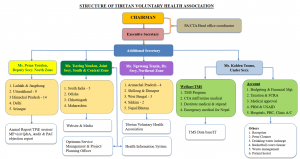Organization Structure
 Public Health Division:
Public Health Division:
The Public Health Division of the Department of Health, CTA works in the area of disease prevention and promotion of health through the implementation of various public health programs with the overall objective to improve community health and to reduce the burden of diseases within the Tibetan community.
The division is further divided into various sections like Mother and Child Health, Mental Health and its Telepsychiatry Program, Health Information System, TB Control, Health Education and Training, Health Media, Disability Support, HIV and Substance Abuse Prevention, and Tibetan Torture survivor’s rehabilitation, Comprehensive Community Outreach and Coordinated Care (CCOCC), Telemedicine, Optimal Service Model and Hepatitis B control project.
The main areas of work conducted by the Public Health Division include:
1) Provision of medical and social support services to improve access to care among needy Individuals like HIV patients, Substance Abuse victims, TB patients, Mental Health patients, Pregnant women, Torture survivors, Destitute, and differently-abled individuals.
2) To promote health awareness and outreach in settlements, schools, and monasteries to reduce the overall burden of diseases within the Tibetan community through observance of the various WHO designated world health days, health education sessions by the field health workers, capacity building training to the health staffs, publication of educational materials and mobile health education initiatives.
3) Implementation of preventive health initiatives like free and subsidized Pap smear screening and HPV vaccination, TB screening, Immunization of children under the age of five, and antenatal checkups. Other screening services are also planned and implemented on a yearly basis based on the proposed project and the availability of funds.
The Program Officer and the various program coordinators of the Public Health Division communicate and coordinate routinely with the field health staff to facilitate the provision of these curative and preventive health services to the target beneficiaries and to successfully implement, monitor, and evaluate the programs at the ground level.
Projects Section:
The project section is responsible to ensure an adequate supply of safe and clean drinking water and proper sanitation in the Tibetan settlements, schools, monasteries, nunneries, etc. The program is a major factor in the promotion of public health in the exile community.
Provision of safe drinking water and clean sanitation facilities commonly includes the following:
- Construction of water tanks;
- Drilling of bore wells;
- Construction and renovation of toilets, bathrooms, drainage, septic tanks, and garbage disposal;
- Provision of water filtration tanks and treatment plants like reverse osmosis plant (RO)
This section raises funds to facilitate ambulance services that provide medical standby 24 hours a day in all the Tibetan settlements; construction and renovation of hospitals and its staff quarters; and also appealing to individuals, corporate and associations to adopt one of the clinics of the Health Department.
Tibetan Medicare System:
Tibetan Medicare System is a holistic secondary and tertiary health care (hospital care) coverage for all Tibetans living in India under the responsibility of the Tibetan Voluntary Health Association (TVHA), registered under the Societies Act 1860. The system is built on the Public-Private Partnership model and creates a health fund across the entire Tibetan exile community. It provides equitable and comprehensive health care coverage on a yearly basis designed to serve the health care needs of the entire Tibetan exile community by creating a more sustainable financing source. TMS contributes towards a holistic preventive and curative system integrating both ‘SORIG’, the Tibetan traditional herbal medicine, and allopathic medicine system in order to deliver effective and efficient health care services tailored to the needs of the Tibetan community in exile.